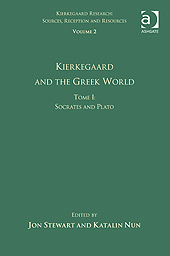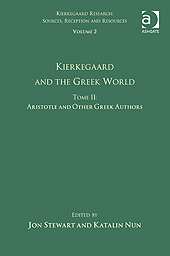
Kierkegaard Research: Sources,
Reception and Resources
|
||

  |
||

|
Volume 2:
Edited by Jon Stewart and Katalin Nun
Tome I: Socrates and Plato
The present volume features articles that
employ source-work research to trace Kierkegaard’s understanding and use of
authors from the Greek tradition. The articles treat a series of figures of
varying importance in Kierkegaard’s authorship, ranging from early Greek
poets to late Classical philosophical schools. In general it can be said
that the Greeks collectively constitute one of the single most important
bodies of sources for Kierkegaard’s thought. He studied Greek from an early
age and was profoundly inspired by what might be called the Greek spirit.
Although he is generally considered a Christian thinker, he was nonetheless
consistently drawn back to the Greeks for ideas and impulses on any number
of topics. He frequently contrasts ancient Greek philosophy, with its
emphasis on the lived experience of the individual in daily life, with the
abstract German philosophy that was in vogue during his own time. It has
been argued that he modeled his work on that of the ancient Greek thinkers
specifically in order to contrast his own activity with that of his
contemporaries.
Part I: Plato’s Socrates
Aristophanes: Kierkegaard’s Understanding of the
Socrates
Eric Ziolkowski
Kierkegaard’s Socrates Sources in Eighteenth-
Reviews “This exciting collection of essays examines Kierkegaard’s engagement with, and debt to Greek philosophy…. Kierkegaard was shaped by Socrates from the beginning, and continually looked to Socrates (primarily as portrayed by Plato) as a role model and an inspiration, as well as for specific concepts, themes and ideas; Kierkegaard without Socrates is simply inconceivable, and yet it seems as if this relationship is practically ignored. These essays begin to redress this imbalance in Kierkegaard scholarship, by examining Kierkegaard’s relationship with Socrates, the sources he used to develop his view of Socrates, and what he did with his Socrates once he had him….In addition to the essays, the book contains cumulative bibliographies of the relevant writings owned by Kierkegaard, as well as modern secondary literature referenced by the essayists themselves. This book is certain to be useful to anyone doing research on Kierkegaard and Socrates; but more importantly, the essays explore concepts that Kierkegaard took from Plato and Socrates and made his own, so anyone wishing to understand Kierkegaard better will profit from this book regardless of prior background in the Greeks.”Glenn Kirkconnell, Søren Kierkegaard Newsletter, no. 58, November 2011, pp. 10-11.
Tome
II: Aristotle and Other Greek Authors
Part I: Aristotle
and the Debate
about Mediation
Diogenes Laertius: Kierkegaard’s Source and Inspiration
in Kierkegaard’s
Thought
The Skeptics: Kierkegaard and Classical Skepticism
Aeschylus:
Kierkegaard and Early Greek Tragedy
|
Kierkegaard and the Bible,
Kierkegaard and the
Kierkegaard and the
Patristic and Medieval Traditions
Kierkegaard and his
Kierkegaard and his
|
|
The
series Kierkegaard Research: Sources,
Reception and Resources is published Routledge Research, Philosophy
Routledge / Taylor & Francis Group, 711 Third Ave., Eighth Floor, New York, NY 10017, USA
|
||









